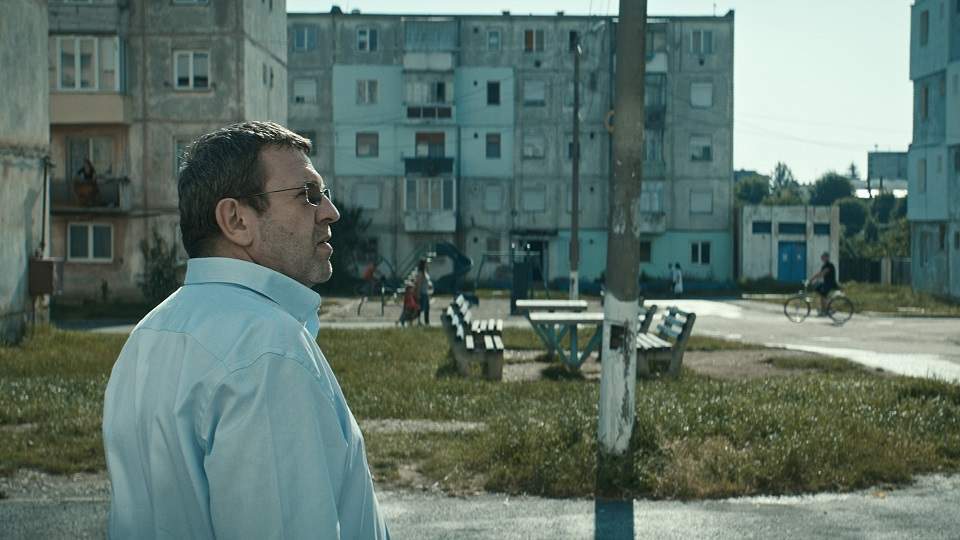AMMAN —
"Bacalaureat" or "Graduation" was screened at the 33rd
edition of the European film festival (
EUFF) on Sunday.
اضافة اعلان
The film
follows the father, a middle-aged doctor named Romeo, attempting to secure the
future for his daughter Eliza by taking extreme measures to ensure she attends
a British University. "Graduation" seeks to push the question of good
intentions and realistic outcomes and present the societal conflicts in
Romanian culture.
The film
was directed by Romanian director Christian Mungiu, who is known as one of the
pioneers of contemporary Roman cinema.
Mungiu is
known for how he deals with reality in unconventional forms. He emphasizes the
importance of subtle performance and details to extract the meaning from the
scene. He established strict control of the portrayal of dramatic scenes to
remain governed, never allowing the film to deviate towards uncalculated
exaggeration or escalation when presenting emotions.
Instead,
Mungiu relies on quiet and calculated performances when filming. He aims to
present dialogs that reveal the truth about a character's economic standing,
social environment, and personality. In addition, through specific filming
techniques, the use of lighting to cast shadows in certain scenes, he can
present characters as isolated, even if they are physically together, which
increases the complexity of characters for viewers.
Spoiler
Warning
Mutual services in a gloomy circumstance
The
atmosphere of the movie is depressing and isolating.
To begin,
we are introduced to a doctor and professor teaching medicine, Romeo, who is
supposedly upper-middle-class. He lives with his wife, Magda, in an apartment
similar to all the ones surrounding him, an ugly gray building that reflects
the nature of what is known as "socialist architecture".
The
architecture is integral to the setting as the camera shows the houses as if
they were going through a large prison, where everything is identical.
 "Graduation" seeks to push the question of good intentions and
realistic outcomes and present the societal conflicts in Romanian culture.
(Photo: IMDb)
"Graduation" seeks to push the question of good intentions and
realistic outcomes and present the societal conflicts in Romanian culture.
(Photo: IMDb)
Romeo takes
his daughter, Eliza, to school and stops to see his mistress Sandra, a divorcee
with a child and a teacher at Eliza’s school. However, a phone call from
Romeo's wife makes him rush to the hospital.
Eliza was
sexually assaulted before she reached her school. Due to the assault, her wrist
is broken, and she is emotionally unwell.
Eliza,
faced with this traumatic event, is struggling to finish her final
examinations, which would ensure her scholarship at the British University to
study psychology. Thus, what was previously a formality suddenly becomes
uncertain.
Romeo and
his wife Magda had previously left Romania in 1991. Eventually, they returned
with hopes of being there to help Romania escape its failed communist past and
move into a modern future. His return is a decision that he deeply regrets, and
now his only hopes are in his daughter, and this is where the story begins,
with a dismal and challenging circumstance leaving the father with little
choice.
To ensure
Eliza’s grades are unharmed and her scholarship is secured, Romeo consults the
chief investigator in private, and they come to an arrangement where Romeo will
expedite a corrupt government official's liver transplant by placing him on top
of the list, in exchange for Eliza’s grades being changed. Even though unsure
of his actions, Romeo goes on with this plan to try and secure Eliza’s future.
This chain
of "mutual services" among people in positions of power didn't
necessarily harm anyone, but it certainly benefits some at the expense of
others.
This ring
of corruption provides an insight into the larger the network in the country.
Morally gray characters
The
complications in the film present a moral dilemma in which Mungiu executes
phenomenally. He gives the situation without jumping to conclusions about his
character's personality, avoiding the good versus evil trope that we are used
to seeing in movies. Instead, we are faced with morally gray characters,
forcing us to question the impacts of the character's actions while weighing in
their intentions, creating a dichotomy both frustrating and essential to
experience.
Romeo's
wife, who discovers his relationship with Sandra, insists on evicting him from
their home but still understands his desire for Eliza to take her finals, which
she previously refused. Romeo, who is on a mission to ensure Eliza's future,
but is unwilling to accept reality, accepts Magda's punishment. Finally, Eliza
does not accept or reject her father's efforts to ensure her spot, and ends up
not knowing if she will pursue her university plans. All these dilemmas are
presented in ways where viewers are forced to analyze the characters' morality
before casting a right or wrong judgment.
The camera that hides more
than it detects
While the
camera seeks to present a visual representation of the story of Eliza and her
father's intense need to ensure her success, it allows viewers to draw most of
the conclusions.
 A middle-aged doctor named Romeo, attempts to secure the future for his
daughter Eliza by taking extreme measures to ensure she attends a British
University. (Photo: IMDb)
A middle-aged doctor named Romeo, attempts to secure the future for his
daughter Eliza by taking extreme measures to ensure she attends a British
University. (Photo: IMDb)
The film is
set up is not designed to show us the intricate details of what or why the
events unfolded. Conventional definitions of right and wrong, expectations, and
traditional resolutions are thrown out in this movie.
This Mungiu
film, an excellent representation of Faustian cinema, where characters sell
their soul to the devil or sacrifice their values in the literal and
metaphorical sense to achieve material gain or power. Mungiu presents this
Faustian dilemma with bizarre and almost logical settlements that the
characters themselves feel obliged to take but leave viewers with a sense of
questioning.
Mungiu
encourages viewers to appreciate the realism of the situation, and he invites
viewers to question and wonder, under what circumstance would they bend their
ideal of morality to do what they think is right or for the sake of their loved
ones.
As much as
Mungiu's film asks questions about fatherhood, role models, and the culture of
corruption rooted in Roman society, it also presents the relativism of morality,
actions, and behavior.
Read more Trending



